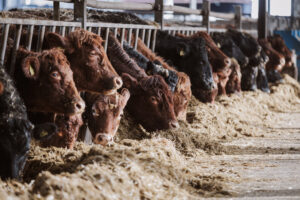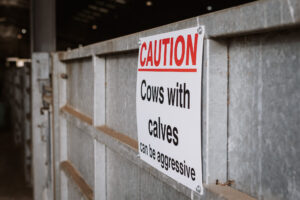 Incidents involving livestock topped the list as the leading cause of work-related fatalities on British farms, according to findings that prompted the Health and Safety Executive (HSE) to refocus its Your Farm, Your Future campaign, which relaunched on Monday, 19 February 2024.
Incidents involving livestock topped the list as the leading cause of work-related fatalities on British farms, according to findings that prompted the Health and Safety Executive (HSE) to refocus its Your Farm, Your Future campaign, which relaunched on Monday, 19 February 2024.
HSE statistics reveal that injuries caused by animals accounted for the highest number of work-related deaths on British farms in 2022/23, with a total of eight fatalities recorded during that period.
Agriculture continues to be one of the most perilous industrial sectors in the country.
Last year, HSE’s campaign concentrated on transport safety, and now, as the campaign recommences, the organization provides new guidance on working with livestock, available on its Your Farm Your Future campaign website, to assist farmers and workers in ensuring their safety.
Although practical measures can be implemented to keep animals and individuals separated, it is essential for handlers to be in good health, agile, and possess the physical capability to perform the work.
Collectively, incidents involving livestock and farm vehicles contribute to approximately half of all work-related deaths on British farms over the past five years, resulting in a total of seventy-seven lives lost, each leaving a devastating impact on families. Additionally, hundreds more individuals sustain injuries in accidents involving moving vehicles and cattle on farms. Incidents with moving vehicles remain the primary cause of death over the last five-year period.
 Adrian Hodkinson, the agriculture lead at HSE, commented, “Working with cattle and using vehicles are two very common activities in farming, but they bring with them a high risk of being very badly hurt.”
Adrian Hodkinson, the agriculture lead at HSE, commented, “Working with cattle and using vehicles are two very common activities in farming, but they bring with them a high risk of being very badly hurt.”
“This campaign is focused on work with livestock and aims to stress how important it is to take sensible measures to keep animals and people apart. At the same time, we’ll be continuing to highlight the key things for the safe use of farm vehicles in and around the yard and sheds, but also out in the fields when checking, feeding, moving, and caring for your herd.”
For instance, ATVs (or farm quads), commonly used on livestock farms, have been a focus of HSE’s attention due to reported incidents where users were engaged in farming activities at the time of overturns or crashes. Therefore, the campaign aims to raise awareness of both cattle safety and farm vehicle safety.
Hodkinson emphasized, “Agriculture consistently has a high rate of fatal and serious injuries of all main industry sectors in Great Britain. Over the past five years, the average fatal incident rate is twenty-one times higher in agriculture than the average across all other industries. That is a shocking statistic, and sadly, the impact on every affected farm is huge. Sometimes I see the incident leads to farming work stopping altogether, as the key person has life-changing injuries and can no longer work.”
 “It’s time for us to make a change together to make our farms safer, and that’s why we’re asking farmers in England, Scotland, and Wales to consider these areas of their daily farming activities and take the right actions to prevent another farming tragedy.”
“It’s time for us to make a change together to make our farms safer, and that’s why we’re asking farmers in England, Scotland, and Wales to consider these areas of their daily farming activities and take the right actions to prevent another farming tragedy.”
This year’s campaign will focus on both livestock and farm vehicles. To support farmers, HSE has developed new webpages and a checklist for working safely with livestock – targeted at those new to farming and serving as a reminder for experienced farmers. The advice covers three areas:
Operating a Safe Farm – Where possible, keep people and cattle apart:
- Safe equipment
- The animal
Hodkinson concluded, “We understand the significant pressures faced by British farmers and want to support the farming community to show that safety on the farm doesn’t need to be difficult or expensive. There are simple steps you can take today to help keep you and everyone on your farm safe.
“Farmers and farm workers should take a moment to think about what would happen to their families and their farms if they were seriously injured and unable to work.
“When people on farms start their daily routine, they should follow our advice to help plan the job and complete it safely.”

